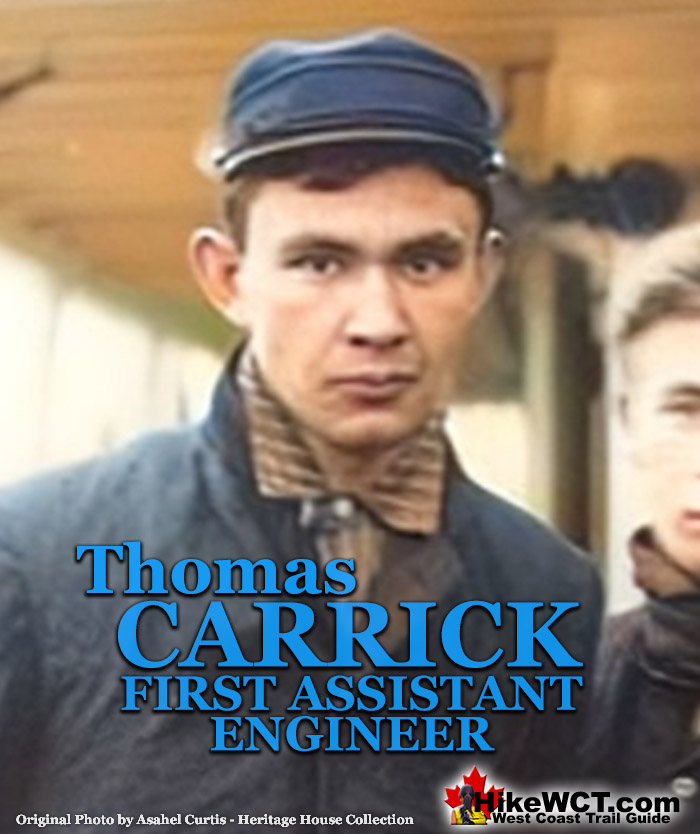![]() Thomas Carrick Valencia Survivor
Thomas Carrick Valencia Survivor
The Valencia Disaster
![]() 1. The Valencia
1. The Valencia ![]() 2. The Voyage
2. The Voyage ![]() 3. The Boats
3. The Boats ![]() 4. The McCarthy Boat
4. The McCarthy Boat ![]() 5. The Bunker Party
5. The Bunker Party ![]() 6. On the Valencia
6. On the Valencia ![]() 7. The Rafts
7. The Rafts ![]() 8. The Turret Raft
8. The Turret Raft ![]() 9. The Rescue Ships
9. The Rescue Ships ![]() 10. The Aftermath
10. The Aftermath ![]() 11. The Survivors
11. The Survivors ![]() 12. The Lost
12. The Lost
The West Coast Trail
![]() Prologue
Prologue ![]() 1: The West Coast Trail
1: The West Coast Trail ![]() 2: When to Hike & Fees
2: When to Hike & Fees ![]() 3: Trailheads
3: Trailheads ![]() 4: Getting There
4: Getting There ![]() 5: Considerations
5: Considerations ![]() 6: Campsites
6: Campsites ![]() 7: Shipwrecks
7: Shipwrecks ![]() 8: Routes
8: Routes ![]() 9: Sights & Highlights
9: Sights & Highlights
Thomas Carrick Valencia Survivor
Thomas Carrick, the first assistant engineer on the Valencia survived on the second raft picked up by the Topeka. In the chaotic first hour of the wreck, Carrick was in charge of the No.7 lifeboat. Timothy McCarthy, boatswain on the Valencia recalled, “No.7 was a wrecking boat and was small. She was in charge of Assistant Engineer Carrick. As she was lowered, one end became unfastened, and the people in her were spilled into the sea, all losing their lives except Carrick, who was pulled on board by his shipmates.” The Valencia wrecked just before midnight on Monday, January 22nd. About 34 hours later, at 10am Wednesday morning the situation on the Valencia was horrific. Battered by waves, the ship was breaking apart and sinking lower into the crashing ocean. Rescue ships had appeared in the distance, however no attempt at rescue had been made. Knowing the ship could collapse under the waves at any moment, the crew decided to launch the last two life rafts. The rafts are designed to float and remain stable, however those on board would be constantly soaked from waves crashing over the sides. The survivors on the Valencia were already freezing cold, hungry and thirsty and most refused to get on the rafts. The first of two rafts left the Valencia half full, with just 10 men on board. Not expected to get far, it broke over the breakers and out to sea with surprisingly little difficulty. The second raft was then packed with Thomas Carrick and 18 other men and set off twenty minutes after the first. Breaking into the open sea they paddled furiously toward the distant ships.
Carrick was part of the Valencia inquiry in the days that followed the disaster. On January 29th The Call p2 reported on part of Carrick's interview, “The other raft was launched about twenty minutes before we left. There were ten persons aboard it. The question was asked why more passengers and less of the crew did not board the craft. “Did the sailors attempt to crowd the passengers off?” was asked. “No,” was the answer of the witness. “The passengers would not leave the ship.” Carrick said the first raft cleared the ship’s side in safety and had little trouble getting out into the open sea. “The raft we left on” said Carrick, “was the last thing aboard the ship for anyone to get on. The Valencia was broken up and the two parts of her were ten to fifteen feet apart, the stern working toward the shore. The foremast was standing, but there was no one in the rigging. The only persons washed overboard that I saw were a woman and her child.”
“The seas were very heavy and knocked us down unless we had something to hold to. There was only about fifteen feet of the hurricane deck left for us to stand on, and I should judge that there were fifty to seventy-five persons on this.” “When we put off from the ship on the raft I called to my oilers in the rigging to come with us, but they refused. All the forward part of the vessel was under water at this time. There was no disobedience to commands at any time. Every member of the crew obeyed the orders of his superiors, as far as I knew. When we pulled away from the vessel the last words I heard the captain say were: ‘Goodbye Tom. For God’s sake try to save your passengers and crew.”
The battered raft headed out to sea toward the rescue ship, the Queen in the distance. To their horror the Queen sailed away. When they lost sight of it they turned toward the land. Freezing and constantly wet they were tossed by the waves and five hours later, close to dead from exposure, they sighted another ship, the Topeka and were finally rescued. The barely alive men on the Topeka raft had no way of knowing that the Valencia crumbled into the sea about three hours ago, killing all the remaining survivors. They wouldn’t hear that news for a couple more hours. When they asked about the first raft, they were dumbfounded to hear it must still be out there. They barely survived five hours of hell on the second raft, the first raft, later called the Turret Raft was still going through hell. A horrific journey considerably more brutal and lasting 26 hours. When the Topeka Raft was getting rescued, the nightmare on the Turret Raft was just beginning.

